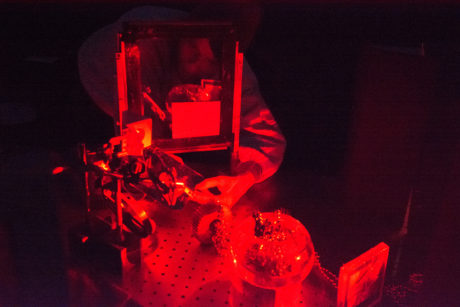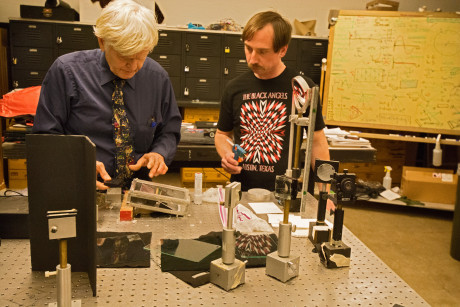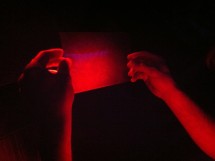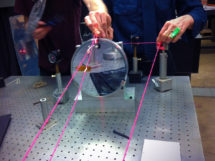The Center for the Holographic Arts in conjunction with Ohio State University offers a studio program to enable artists learn about holography and produce holographic artwork.
There are two opportunities offered at the pulse laser studio in Columbus, Ohio
…what is a pulse laser?1.
Pulse Laser Holography Workshop
April, 2020 – 5 days (most likley April 19 – 23.. TBC)
During this hands-on workshop five artists learn how to create holographic images. Designed as an introductory course, the workshop includes using the pulse laser to record a master hologram and working on an optical table with a continuous wave laser to transfer the master recording into a holographic print. The workshop is taught by holographers Sam Moree and Professor Harris Kagan.
See documentation by previous participants
To be scheduled with Prof. Kagan in Fall 2020
Since 1999 the Center for the Holographic Arts has enabled over 50 artists to produce artwork that are shown in museums and galleries around the world.
This residency gives the artist (or group) access to the ruby pulse laser and continuous wave transfer table to create a holographic artwork. The project can focus on creating pulse masters or a single master with a reflection or transmission print. The pulse laser can image a volume ~3′ cubed. For transfers there are plate holders up to 12″ x 16″ and a 4′ x 12′ optical table is available. During the residency the artist may be asked to give a talk about their art practice to the students at Ohio State University and engage with the advanced holography class.

What is provided
Artists will have assistance and access to the holography laboratories including the pulse laser studio at Ohio State University. Holographic film and chemistry will be provided for the Workshop. For the Artist Residency you will need to bring your own film or we can arrange for you to purchase film.
Artists will need to meet the cost of accommodation, travel and any other materials required for their project. A letter of support can be provided to help artists apply for funding to assist with their expenses.
Experience
Before applying all artists should have a basic knowledge of holography. A good place to start: What is holography? and taking an introductory workshop
Artists who have not previously made their own holograms should apply first to the Pulse Laser Holography Workshop.
The Pulse Laser Artist Residency is aimed at active artists who have a plan to exhibit the work produced. Your project should have a strong concept and clear plan that can realized with the facilities available.
The HoloCenter can provide mentoring and consultation to artists who wish to develop significant holographic artworks at other facilities. The Holographic Art Grant funded by the Hologram Foundation offers an annual award to fund the production high quality art holograms.
Application
All applications:
– Contact details
– Artist Bio/CV
– Up to three URLs showing recent work
Maximum 2 pages, PDF file, labeled with “YourName_Bio.pdf”
For the Pulse Laser Holography Workshop also include:
– Why you want to explore holography and how this relates to your art practice
Maximum 1 page PDF file, labeled with “YourName_Workshop.pdf”
For the Pulse Laser Artist Residency also include:
– Proposed project summary (images & diagrams are great)
– Where or how the work will be exhibited
Maximum 3 pages PDF file, “YourName_Project.pdf”
Submit application
Email your application to info@holocenter.org by February 28, 2020
Please indicated if you are applying for the Holography Workshop or Artist Residency in the subject line.
Applications are assessed by a panel. Workshops participants are primarily selected due to their motive to learn about holography and how this experience will expand their practice. Holographic Artist Residencies are awarded based on the proposed project and the artistic merit of previous work.
A short clip of a master hologram made by Patrick Boyd during his Pulse Laser Artist Residency at OSU.
Project supported by Arts Council Wales. Assisted by Steve Weinstock & Sam Moree
1 A ‘Pulse Laser’ enables holograms to be recorded of moving subjects, akin to a high-speed flash photograph. To make holograms of people a pulse laser is needed. To make the hologram a flash of laser light is split, and directed through optics and diffuses to illuminate the subject and the holographic film. The light recombines in the film to create an interference pattern that encodes the light reflected by the subject. The Pulse laser at Ohio State University is a 1 Joule JK-Ruby laser that emits red light (694nm).
header photos by Hannah Mishin, 2015 Workshop




